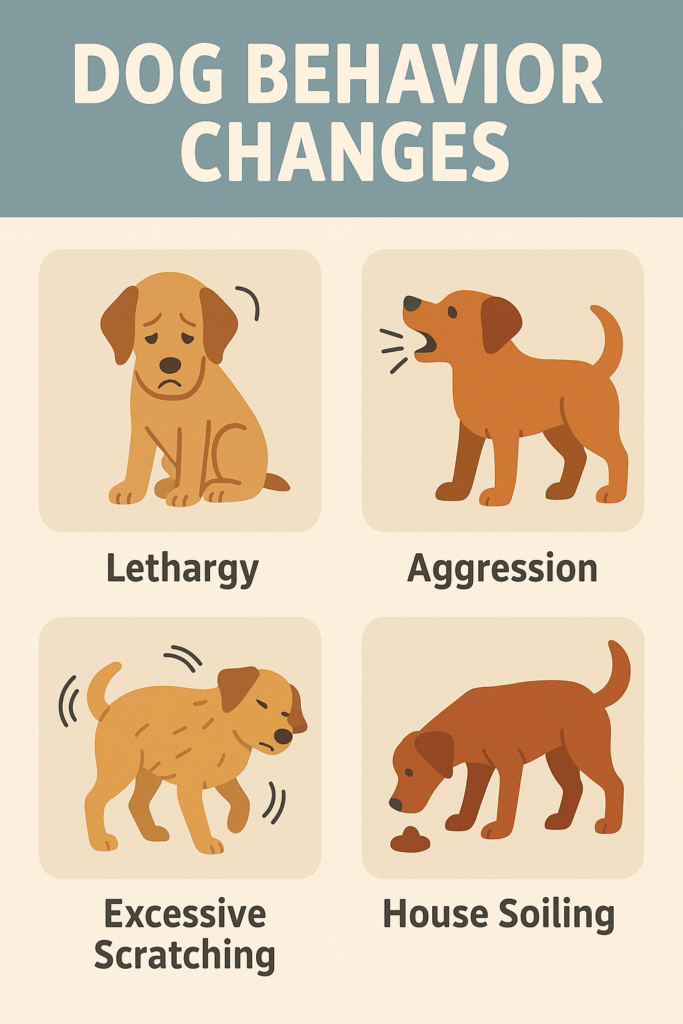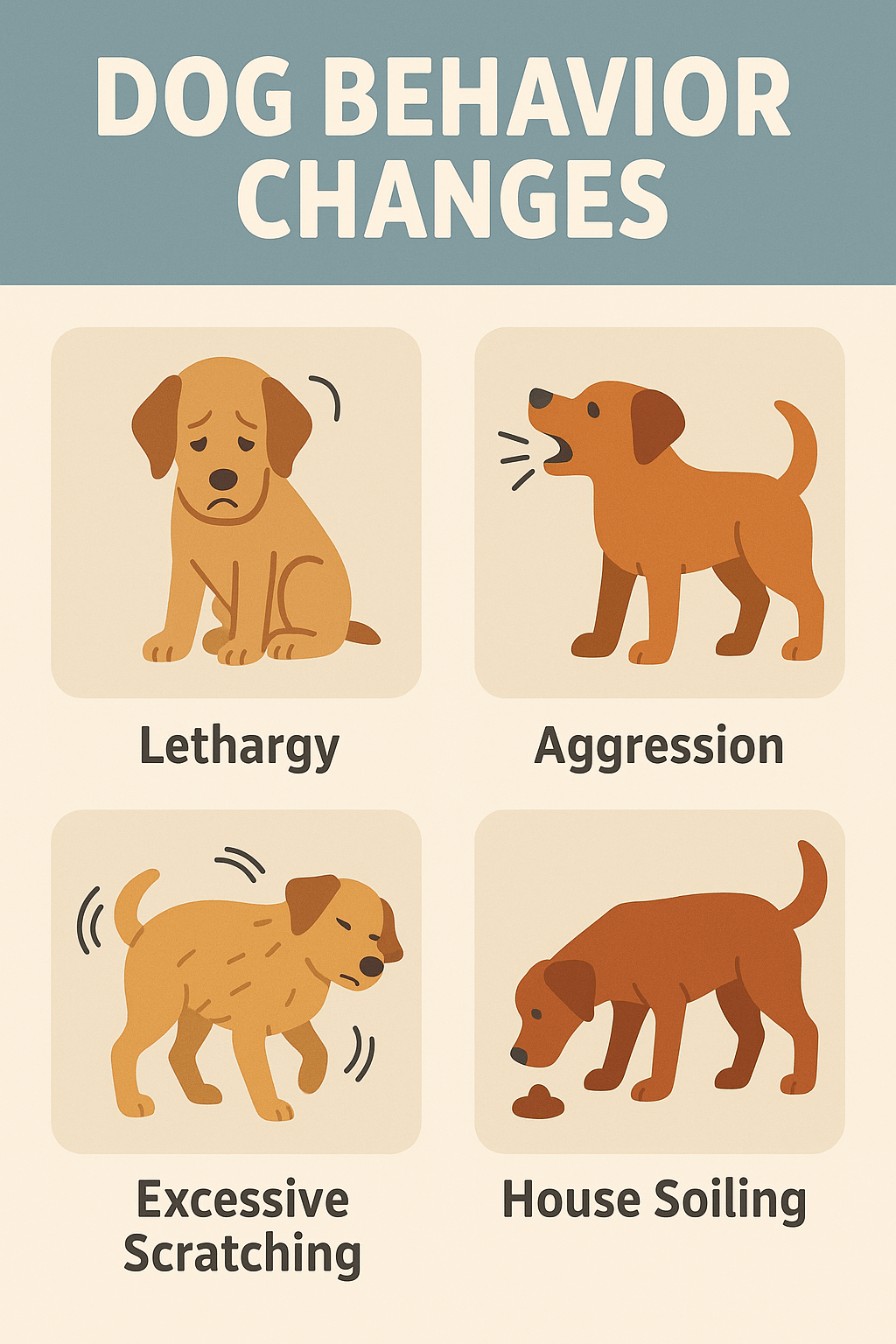Dog Behavior Changes: What You Need to Know
Dogs are known for their loyalty, companionship, and predictable routines. However, just like humans, dogs can experience behavior changes due to various factors such as age, environment, health, or emotional shifts. These changes can range from minor adjustments in habits to more significant behavioral issues that require attention. Understanding why your dog’s behavior might change is crucial for maintaining a strong bond and ensuring their well-being. In this blog post, we’ll explore the common causes of dog behavior changes, how to identify them, and what steps you can take to address them effectively.
Expert Insight: Dr. Jess
“One of the most common reasons for a sudden change in a dog’s behavior is a medical issue. Just like humans, dogs can experience health problems that may manifest in changes in behavior. For example, a dog in pain may become more aggressive or irritable, while a dog with a thyroid issue may become lethargic and withdrawn.”
— Dr. Jess
Common Causes of Dog Behavior Changes
Behavioral shifts in dogs often stem from underlying causes that may not always be immediately obvious. Identifying the root cause is the first step toward addressing the issue.
Health Issues:
Pain, discomfort, or chronic conditions like arthritis can lead to irritability, lethargy, or aggression in dogs.Aging Process:
Senior dogs may exhibit changes in behavior due to cognitive decline, vision or hearing loss, or reduced mobility.Environmental Stressors:
Moving homes, loud noises, or the introduction of new family members (human or animal) can disrupt a dog’s sense of security.Lack of Exercise or Stimulation:
Boredom or pent-up energy can result in destructive behaviors, excessive barking, or hyperactivity.Emotional Factors:
Anxiety, fear, or separation distress can manifest in behaviors like pacing, hiding, or clinginess.
Recognizing these triggers can help you better understand your dog’s needs and provide appropriate support during challenging times.

Signs Your Dog’s Behavior Is Changing
Behavioral changes in dogs aren’t always dramatic—they can be subtle and easy to overlook if you’re not paying close attention. Here are some red flags to watch for.
Changes in Appetite:
A sudden refusal to eat or overeating could indicate stress, illness, or other underlying issues.Altered Sleep Patterns:
Sleeping significantly more or less than usual may signal physical discomfort or anxiety.Increased Aggression or Fearfulness:
Growling, snapping, or avoiding interactions with people or other animals can point to emotional distress.Excessive Licking or Chewing:
Dogs often lick or chew excessively when they’re anxious, bored, or experiencing skin irritation.Accidents Indoors:
House-trained dogs urinating or defecating inside may be dealing with urinary tract infections, stress, or age-related incontinence.
Noticing these signs early allows you to intervene promptly and prevent further complications.
Check this guide 👉Dog Puberty Behavior: Best 7 Expert Tips!
Check this guide 👉Male Dog Behavior When Female Is Pregnant: Best 7 Tips!
Check this guide 👉Dog Pack Behavior with Humans: Best 7 Expert Tips!
Behavioral Changes in Dogs | Possible Underlying Causes |
|---|---|
Sudden aggression | Pain, fear, territorial instincts |
Excessive barking | Anxiety, boredom, attention-seeking |
Withdrawal or hiding | Illness, trauma, environmental stress |
Destructive chewing | Lack of exercise, teething, frustration |
Pacing or restlessness | Cognitive decline, anxiety, discomfort |
How to Address Dog Behavior Changes
Once you’ve identified the cause of your dog’s behavioral shift, it’s time to take action. Here are some practical steps to help restore balance and harmony.
Consult a Veterinarian:
Rule out medical conditions by scheduling a check-up with your vet. Many behavioral changes are linked to undiagnosed health problems.Provide Mental and Physical Stimulation:
Engage your dog with interactive toys, puzzles, or daily walks to burn off excess energy and reduce boredom.Create a Calm Environment:
Minimize stressors by establishing a quiet, safe space where your dog can retreat when feeling overwhelmed.Reinforce Positive Behaviors:
Use treats, praise, and rewards to encourage desirable actions and discourage negative ones. Consistency is key.Consider Professional Help:
If the behavior persists, consult a certified dog trainer or animal behaviorist for personalized guidance.
Taking these steps can help your dog feel secure and supported while addressing the root cause of their behavior changes.
Preventing Future Behavioral Issues
Prevention is always better than cure when it comes to managing your dog’s behavior. Proactive measures can reduce the likelihood of future problems.
Establish a Routine:
Dogs thrive on consistency. Stick to regular feeding, walking, and sleeping schedules to create a sense of stability.Socialize Your Dog Early:
Expose your dog to different environments, people, and animals during their formative months to build confidence and adaptability.Monitor Their Health Regularly:
Schedule routine vet visits to catch potential health issues before they affect behavior.Teach Basic Commands:
Training your dog to follow commands like “sit,” “stay,” and “leave it” helps manage their behavior in various situations.Stay Attuned to Their Needs:
Pay attention to your dog’s body language and vocalizations to identify signs of discomfort or stress early.
By prioritizing prevention, you can foster a happy, well-adjusted dog who thrives in any situation.
How to Build Trust After Behavioral Changes
Rebuilding trust is essential if your dog’s behavior has been affected by trauma or stress. Strengthening your bond can help them feel secure again.
Spend Quality Time Together:
Dedicate one-on-one time to activities your dog enjoys, like walks or playtime, to reinforce your connection.Use Positive Reinforcement:
Reward calm and obedient behavior with treats, praise, or affection to encourage trust-building.Avoid Punishment:
Harsh corrections can damage trust further. Focus on gentle guidance instead.Respect Their Boundaries:
Allow your dog to approach you at their own pace, especially if they’ve experienced trauma.Be Patient and Consistent:
Trust takes time to rebuild. Stay consistent in your efforts to show your dog they’re safe with you.
With patience and kindness, you can restore your dog’s confidence and deepen your relationship.
The Role of Diet in Dog Behavior
Your dog’s diet plays a significant role in their overall behavior and mood. Ensuring proper nutrition can help prevent unwanted behavioral changes.
Balanced Nutrition:
A diet rich in protein, healthy fats, and essential vitamins supports brain function and emotional stability.Avoid Artificial Additives:
Some dogs react negatively to artificial colors, flavors, or preservatives, which can affect their mood and behavior.Hydration Matters:
Dehydration can lead to fatigue or irritability. Ensure your dog always has access to fresh water.Food Sensitivities:
Allergies or intolerances to certain ingredients can cause discomfort and behavioral shifts.Portion Control:
Overfeeding or underfeeding can impact energy levels and temperament. Stick to recommended serving sizes.
A well-balanced diet lays the foundation for a happy, healthy dog with stable behavior.
Seasonal Effects on Dog Behavior
Seasonal changes can influence your dog’s behavior in unexpected ways. Understanding these effects helps you prepare and adapt accordingly.
Winter Lethargy:
Cold weather and shorter days may make dogs less active and more prone to napping.Summer Restlessness:
Heat can make dogs irritable or reluctant to exercise during peak temperatures.Springtime Excitement:
Warmer weather and blooming plants may increase your dog’s energy levels and curiosity.Holiday Stress:
Loud fireworks or gatherings during holidays like New Year’s Eve or Independence Day can trigger anxiety in sensitive dogs.Seasonal Allergies:
Pollen, dust, or mold allergies can cause discomfort, leading to scratching, chewing, or irritability.
Being mindful of seasonal influences allows you to anticipate and address behavioral shifts as they arise.
Frequently Asked Questions About Dog Behavior Changes
Why is my dog suddenly acting aggressive?
Aggression can stem from pain, fear, or territorial instincts. Consult a vet to rule out medical issues, then work with a trainer if needed.
What should I do if my dog starts chewing furniture?
Provide appropriate chew toys and increase physical activity to redirect their energy. Addressing boredom or anxiety may also help.
Can aging cause behavioral changes in dogs?
Yes, senior dogs may experience cognitive decline or physical limitations that affect their behavior.
How do I know if my dog is stressed?
Signs include panting, pacing, hiding, excessive licking, or changes in appetite and sleep patterns.
Is it normal for puppies to have behavioral quirks?
Yes, puppies are still learning and adapting. Consistent training and patience can help shape their behavior positively.
Understanding and Supporting Your Dog Through Behavioral Changes
Behavioral changes in dogs are natural and often manageable with care, patience, and understanding. By staying attuned to your dog’s needs and addressing issues promptly, you can strengthen your bond and ensure their happiness and well-being. Whether the cause is health-related, environmental, or emotional, taking proactive steps will help your furry friend navigate life’s challenges with confidence. Remember, your love and support are the most powerful tools in guiding your dog through any behavioral shifts they may experience.
Do Cats Have Taste Buds? Best 7 Expert Tips! – Discover how cats experience flavors and why their taste is so unique.
Do Dogs Have Taste Buds? Best 7 Expert Tips! – Discover how dogs experience taste, their preferences, and what it means for their diet and health.
Can Cats Taste Sweet? Best 7 Expert Tips! – Discover why cats can’t taste sweetness, how it affects their diet, and tips to keep them healthy and happy.
Can Dogs Taste Sweet? Best 7 Expert Tips! – Discover how dogs perceive sweetness, which foods are safe, and tips to manage their sweet cravings responsibly.





